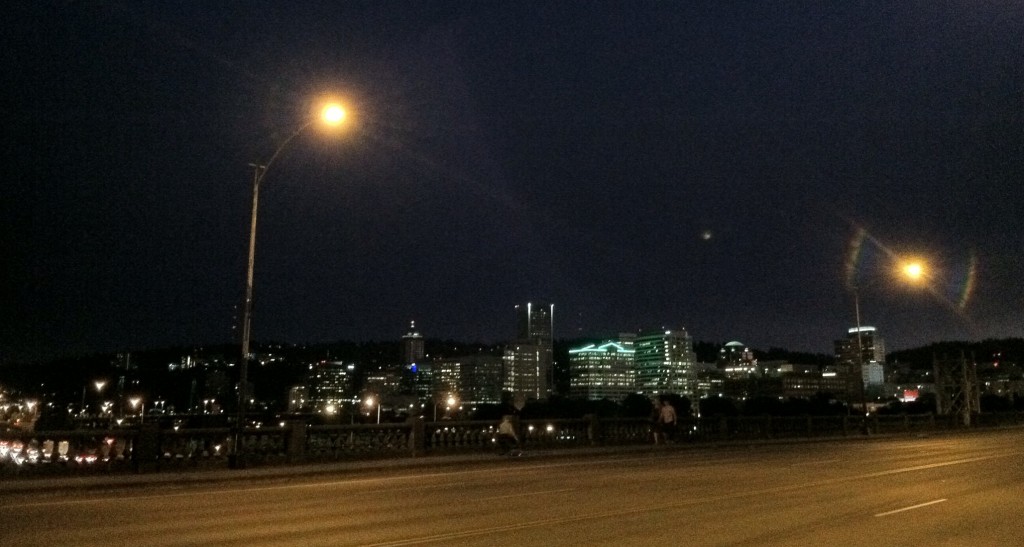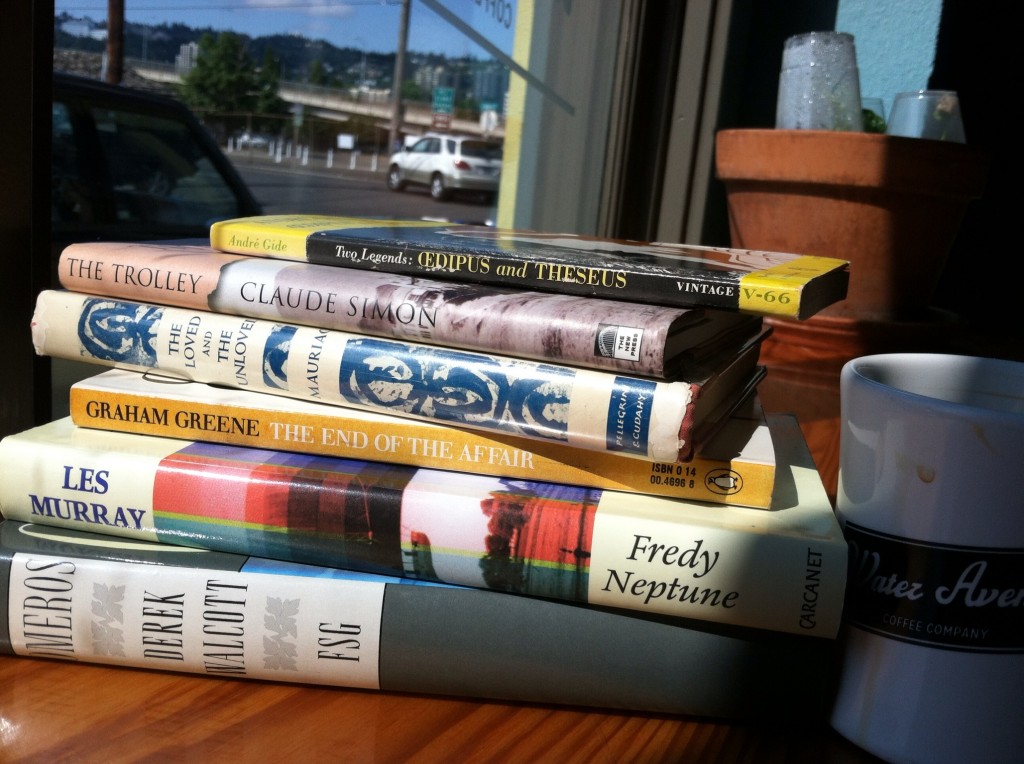I.
 Portland. Walking west across the Burnside Bridge at dusk can bring you to your senses. Your legs tighten against the wind of passing cars and the lewd buzz of a motorbike fleet. Your vision grows fat on the baroque skyline glowing before you. Unlike other cities whose profiles front the sky, Portland’s is cradled by wooded hills to the southwest, rendering it, against its own extroversion, intimate, offered. You can’t refuse. Momentarily glutted, you look to your right for relief from the Willamette, and see in the waning light the illuminated windows of the light rail rolling through the trusses of the North Steel Bridge, and your memory skirts the peripheries of Bladerunner, Metropolis, Miyazaki. On the descent, you look over the guard into a waterside park deep in the city’s shadow, where youth trade joints and important thoughts. As you leave the bridge, you meet a contingent of the homeless gathered about the walls of the Portland Rescue Mission. A drunk man in pajama bottoms wends between parked cars, barking. At the base of a sidewalk tree you catch a whiff, not of urine, of life for once not your own.
Portland. Walking west across the Burnside Bridge at dusk can bring you to your senses. Your legs tighten against the wind of passing cars and the lewd buzz of a motorbike fleet. Your vision grows fat on the baroque skyline glowing before you. Unlike other cities whose profiles front the sky, Portland’s is cradled by wooded hills to the southwest, rendering it, against its own extroversion, intimate, offered. You can’t refuse. Momentarily glutted, you look to your right for relief from the Willamette, and see in the waning light the illuminated windows of the light rail rolling through the trusses of the North Steel Bridge, and your memory skirts the peripheries of Bladerunner, Metropolis, Miyazaki. On the descent, you look over the guard into a waterside park deep in the city’s shadow, where youth trade joints and important thoughts. As you leave the bridge, you meet a contingent of the homeless gathered about the walls of the Portland Rescue Mission. A drunk man in pajama bottoms wends between parked cars, barking. At the base of a sidewalk tree you catch a whiff, not of urine, of life for once not your own.
 If you read books and know Portland, you know where this is heading. Ten blocks up from the bridge a large unprepossessing sign presides over the intersection –“Powell’s”. Because you are, at base, a romantic, you were half expecting this famous million-volume bookstore to be housed in something a bit lovelier than this particular building, this industrial rectangle with less architectural romance than a laundromat. Yet as you approach, as you take in the glass storefront, you feel expanded, as at that first sight of the ocean which had countered and held your sense of loss.
If you read books and know Portland, you know where this is heading. Ten blocks up from the bridge a large unprepossessing sign presides over the intersection –“Powell’s”. Because you are, at base, a romantic, you were half expecting this famous million-volume bookstore to be housed in something a bit lovelier than this particular building, this industrial rectangle with less architectural romance than a laundromat. Yet as you approach, as you take in the glass storefront, you feel expanded, as at that first sight of the ocean which had countered and held your sense of loss.
II.
I went to the Oregon Coast to see wave-bashed basalt, miles of sand, lighthouses, and to feel my tiny life threaded back into the large and varied world. Now I was in Portland, at Powell’s, looking for books, those cultural artifacts which more than any others address that very threading.
Of the hundreds of books that beguiled from the kilometers of shelves, I came away with just six, an act of will helped along by the knowledge that whatever I bought had to fit in my carry on. Looking at this little pile now, I’m bemused. If not entirely arcane, its certainly idiosyncratic:
 OMEROS (Derek Walcott) Once again I was holding this book and looking at Walcott’s cover art, that yellow skiff scudding green surf, carrying four figures under a stormy sky. The skiff rides from right to left. In film theory, when a camera pans from right to left, the effect is of moving back in time, towards memory. I’ve always felt Walcott’s skiff is carrying its people home rather than to unknown shores. This is the aim of the epic as a form, to carry a culture across its own history back to itself. I have a recording of Walcott reciting a passage near its end: “I sang of quiet Achilles, Afolabe’s son,/ who never ascended in an elevator,/ who had no passport, since the horizon needs none…” Time to finally own a copy. A first edition, no less.
OMEROS (Derek Walcott) Once again I was holding this book and looking at Walcott’s cover art, that yellow skiff scudding green surf, carrying four figures under a stormy sky. The skiff rides from right to left. In film theory, when a camera pans from right to left, the effect is of moving back in time, towards memory. I’ve always felt Walcott’s skiff is carrying its people home rather than to unknown shores. This is the aim of the epic as a form, to carry a culture across its own history back to itself. I have a recording of Walcott reciting a passage near its end: “I sang of quiet Achilles, Afolabe’s son,/ who never ascended in an elevator,/ who had no passport, since the horizon needs none…” Time to finally own a copy. A first edition, no less.
FREDDY NEPTUNE (Les Murray) A few years back, Dan Chiasson, writing for the New Yorker, described Australian poet Les Murray as “routinely mentioned among the three or four leading English-language poets.” In whose routine? Apparently Walcott and Heaney had company about whom I knew nothing. I found and read a couple of volumes and discovered a cranky, captivating voice, brilliantly subversive, even of its own heartbreak. Chiasson wrote that Murray’s 1998 verse novel, Fredy Neptune, about a German-Australian sailor who, during the First World War, witnesses something so horrific it causes him to lose all sense of feeling in his body, has “little competition…for the claim to being the best verse novel of our time.” I have never seen it in a bookstore, so when I saw it at Powell’s my impulse was to honor it for being there by buying it.
THE END OF THE AFFAIR (Graham Greene) When I asked my friend Anna Pendleton what her favorite book was, without a moment’s hesitation she said The End of the Affair, by Graham Greene. “I love that book!” were she a gusher, she would have gushed. Anna is young, fiercely bright, lovely in all ways, a middle school English teacher, and a self-proclaimed introvert who nevertheless projects terrific energy. She will, I suspect, be single for a much shorter time than she imagines, though she will probably always be mildly chagrined by whomever she finds sitting intimately across from her. When I saw her literary love at Powell’s I opened it and began to read:
A story has no beginning or end: arbitrarily one chooses that moment of experience from which to look back or from which to look ahead. I say ‘one chooses’ with the inaccurate pride of a professional writer who – when he has been seriously noted at all – has been praised for his technical ability, but do I in fact own my will to choose that black wet January night on the Common, in 1946, the sight of Henry Miles slanting across the wide river of rain, or did these images choose me?
Oh Anna, I thought, you like this? Are there no men like you?
THE LOVED AND THE UNLOVED (Francois Mauriac) After Patrick White, Gabriel Garcia Marquez, and William Faulkner, François Mauriac may be my favorite novelist on the Nobel roster. I say “may be” because on any given day he would be elbowing in somewhere between Saul Bellow, Thomas Mann, and José Saramago. Like Patrick White, Mauriac is not talked about much these days. I suspect it is because, as a flinty and ardent Catholic, the existentialists sautéed his reputation and ate it with a glass of Pinot. Too bad for those who read only for confirmation of the rightness of twentieth century malaise. Mauriac’s Catholic malaise, démodé though it is, can attain gruesome heights which leave even malaisophiles gasping for air. I had not heard of this book, a late one in his oeuvre.
THE TROLLEY (Claude Simon) I can count on the fingers of one hand the number of novels I’ve begun and failed to finish. Conducting Bodies, by Claude Simon is one. It was the spoils of one of my undergrad expeditions into the library stacks. Willing I was, but simply not prepared for the nouveau roman’s daunting repudiations. Of plot, for example, and a meaningful sense of time. I’m a different reader now, and with Simon’s centenary coming up in October, it seems time give him another go. This book was his last, written at the age of 88.
TWO LEGENDS: OEDIPUS AND THESEUS (André Gide) I love modern versions of classic literature. Milosz’s “Orpheus and Eurydice”, for example, is one of my favorite poems. A few years back I wrote what I believed to be a brilliant poem on the subject of Theseus. I imagined him in old age, living in a ratty urban apartment, and returning to Hades to liberate Persephone who he and his friend Pirithous had once tried, and catastrophically failed, to abduct. The pathos I evoked, the intellectual rigor and linguistic flights, the adroit iambic pentameter – move over Derek! When I re-read it last year I was appalled by its pompous rigidity. The language certainly took flight –from clarity at every opportunity. I had come across this late work by André Gide in Santa Fe awhile back, and failed to buy it. I wanted to learn; no author’s pen runs more fleetly over maters of greater moral import.
III.
Like a one-night stand who in the morning you realize you’d actually like to get to know, I brought my purchases from the night before to a coffee shop south of the Burnside Bridge on the east side of the river to have a look at them in sober daylight. The Frenchies had won, I saw, and a point each for the Brits, the Aussies, and the Caribbean expats. Two were poets, four novelists. One had lived openly gay. Four had won a Nobel Prize, one probably should have, one still might. I felt happy. I knew that Sam, whom I had loved and lost, and whom I was missing terribly, would never have let me leave Portland without a stack of books just like this one.


